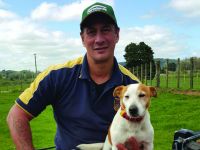Kaitiakitanga never more important
Discovery Issue 40 | Nov 2015

Keith Ikin at his farm in the Waikato
General Manager Māori Development Keith Ikin argues the Environment Aotearoa 2015 report is a call to action for us all.
For a population of 4.5 million, our collective actions are having serious impacts on our environment. There is a clear need for us to change our behaviour and think and act responsibly for the future health and well-being of the country.
Landcare Research’s core objective as a crown research institute is to produce science that supports the health and well-being of our natural environment and the productive use of our land and natural resources for this generation and generations to come. There has never been a time when the benefit of our science to New Zealand has been more critical.
Nitrogen levels in our rivers have increased 12 per cent, with 60 per cent of monitored rivers showing significant increases of nitrogen and E.coli bacteria. The availability of water in our rivers and streams safe enough to drink or swim in has reduced over the last 10 years.
Eighty per cent of indigenous freshwater species and bird life face extinction and wetland habitats have reduced by 90 per cent from their pre-human contact condition. There are other significant impacts on our environment that are set out in the report.
As New Zealanders, there are some serious questions we need to be asking ourselves.
What needs to happen for our communities to change their behaviour that is impacting our environment?
What role does science play to support better decision making and activity with regard to our natural resources?
For Māori decision makers, the questions are the same. Our role as kaitiaki is critical whether we are individual landowners or part of a hapū or iwi collective. The information and thinking that drives our decision-making should not be a trade-off between increased productivity over environmental impact.
Land owners now have better tools and information available to them to ensure they are reducing the environmental impact of land and natural resource-based decisions. We have the opportunity to learn from the agricultural practices of the past and do better for the future.
I am encouraged by the current generation of Māori decision-makers taking leadership roles on land trusts, incorporations and in iwi organisations. There is a new generation of Māori men and women with a broad range of knowledge and experience who are thinking outside the square and are bringing new innovation and approaches to decision-making. It is essential that kaitiakitanga remains a central focus in all of our decision-making.
The exercise of kaitiakitanga is dependent on relevant knowledge and information. This can be found in western science approaches and it can be found through mātauranga Māori.
Matauranga Māori has been described as Māori ways of knowing and understanding the world. It is knowledge that has been created and passed down from generation to generation through interaction and observation of the world around us. It is a way of interacting, understanding and nurturing our environment for the benefit of this generation and generations to come. It is as valid and relevant to our world today as western-based science and knowledge.
Within Landcare Research we have scientists that are acknowledged as world leaders in their field across areas as diverse as soil health, erosion, flood mitigation, nitrogen and carbon impacts, climate change, native flora and fauna, pest and weed control, biodiversity, catchment health and wellbeing, land use options and mapping and many other areas. Landcare Research is a complex organisation made up of more than 300 of the best and brightest scientists in New Zealand.
I look forward to working with Māori decision makers to influence positive change for our environment. We have a responsibility not only to ourselves, but to future generations.
Tuia te rangi e tu nei
Tuia te papa e takoto nei
Tuia tatou te ira tangata ki te whei ao ki te ao marama.
Keith Ikin is the General Manager Māori Development at Landcare Research. He was appointed in July to support effective engagement with Māori.
Comments
Please note - these comments are moderated
